Android 布局
六大布局:
1、线性布局(LinearLayout):按照垂直或者水平方向布局的组件
2、帧布局(FrameLayout):组件从屏幕左上方布局组件
3、表格布局(TableLayout):按照行列方式布局组件
4、绝对布局(AbsoluteLayout):按照绝对坐标来布局组件
5、相对布局(RelativeLayout):相对其它组件的布局方式
6、约束布局 (ConstraintLayout):按照约束布局组件
1.线性布局
对于排列比较有规律的布局一般都用线性布局
android:gravity 用于指定父布局中的子控件在父布局中的位置
android:layout_gravity 用于指定控件在布局中的对齐方式
layout_weight 是linearlayout布局用于不同机型适配的一个技巧,比如下面这个布局:
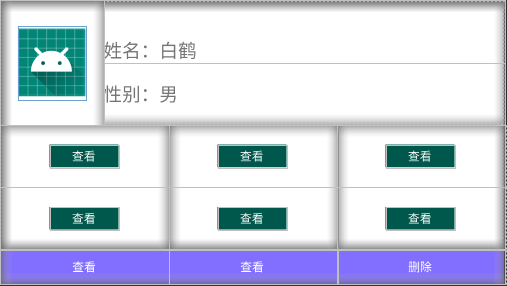
首先是从最大的层次考虑,布局分为两大块,上层和下层。将下层的高度固定为50dp,然后上层用layout_weight 来瓜分剩下的部分。
上层:
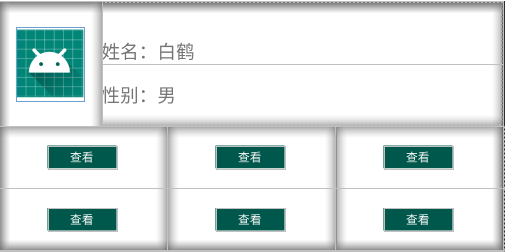
下层:

Code: 注意该类写法中0dp和layout_weight的配套使用
1 | <!--d底部 --> |
1 | <LinearLayout |
在上层布局的imageView和俩个TextView之间的关系也采用这种方式,固定imageView的大小为150dp,剩下的width用layout_weight 平分给两个TextView.
imageView的布局:
1 |
|
两个TextView的布局:
1 | <LinearLayout |
完整layout:

<LinearLayout
android:layout_width="match_parent"
android:layout_height="0dp"
android:orientation="vertical"
android:layout_weight="1">
<LinearLayout
android:layout_width="match_parent"
android:layout_height="match_parent"
android:orientation="horizontal"
android:layout_weight="1">
<LinearLayout
android:layout_width="150dp"
android:layout_height="match_parent"
android:gravity="center">
<ImageView
android:id="@+id/addMemberDialogPhoto"
android:layout_width="98dp"
android:layout_height="107dp"
android:src="@mipmap/ic_launcher" />
</LinearLayout>
<LinearLayout
android:layout_weight="1"
android:orientation="vertical"
android:layout_width="0dp"
android:layout_height="match_parent">
<TextView
android:id="@+id/addMemberDialogName"
android:gravity="bottom"
android:text="姓名:白鹤"
android:textSize="27sp"
android:layout_weight="1"
android:layout_width="match_parent"
android:layout_height="match_parent" />
<TextView
android:id="@+id/addMemberDialogSex"
android:gravity="center_vertical"
android:layout_weight="1"
android:textSize="27sp"
android:text="性别:男"
android:layout_width="match_parent"
android:layout_height="match_parent" />
</LinearLayout>
</LinearLayout>
<LinearLayout
android:layout_width="match_parent"
android:layout_height="match_parent"
android:orientation="vertical"
android:layout_weight="1">
<LinearLayout
android:layout_width="match_parent"
android:layout_height="match_parent"
android:orientation="horizontal"
android:layout_weight="1">
<LinearLayout
android:layout_width="match_parent"
android:layout_height="match_parent"
android:gravity="center"
android:layout_weight="1">
<TextView
android:id="@+id/"
android:layout_width="100dp"
android:layout_height="wrap_content"
android:background="@color/colorPrimaryDark"
android:gravity="center"
android:padding="5dp"
android:textColor="#fff"
android:textSize="17sp"
android:text="查看"/>
</LinearLayout>
<LinearLayout
android:layout_width="match_parent"
android:layout_height="match_parent"
android:gravity="center"
android:layout_weight="1">
<TextView
android:layout_width="100dp"
android:layout_height="wrap_content"
android:background="@color/colorPrimaryDark"
android:gravity="center"
android:padding="5dp"
android:textColor="#fff"
android:textSize="17sp"
android:text="查看"/>
</LinearLayout>
<LinearLayout
android:layout_width="match_parent"
android:layout_height="match_parent"
android:gravity="center"
android:layout_weight="1">
<TextView
android:layout_width="100dp"
android:layout_height="wrap_content"
android:background="@color/colorPrimaryDark"
android:gravity="center"
android:padding="5dp"
android:textColor="#fff"
android:textSize="17sp"
android:text="查看"/>
</LinearLayout>
</LinearLayout>
<LinearLayout
android:layout_width="match_parent"
android:layout_height="match_parent"
android:orientation="horizontal"
android:layout_weight="1">
<LinearLayout
android:layout_width="match_parent"
android:layout_height="match_parent"
android:gravity="center"
android:layout_weight="1">
<TextView
android:layout_width="100dp"
android:layout_height="wrap_content"
android:background="@color/colorPrimaryDark"
android:gravity="center"
android:padding="5dp"
android:textColor="#fff"
android:textSize="17sp"
android:text="查看"/>
</LinearLayout>
<LinearLayout
android:layout_width="match_parent"
android:layout_height="match_parent"
android:gravity="center"
android:layout_weight="1">
<TextView
android:layout_width="100dp"
android:layout_height="wrap_content"
android:background="@color/colorPrimaryDark"
android:gravity="center"
android:padding="5dp"
android:textColor="#fff"
android:textSize="17sp"
android:text="查看"/>
</LinearLayout>
<LinearLayout
android:layout_width="match_parent"
android:layout_height="match_parent"
android:gravity="center"
android:layout_weight="1">
<TextView
android:layout_width="100dp"
android:layout_height="wrap_content"
android:background="@color/colorPrimaryDark"
android:gravity="center"
android:padding="5dp"
android:textColor="#fff"
android:textSize="17sp"
android:text="查看"/>
</LinearLayout>
</LinearLayout>
</LinearLayout>
</LinearLayout>
<LinearLayout
android:layout_width="match_parent"
android:layout_height="50dp"
android:orientation="horizontal">
<TextView
android:layout_width="match_parent"
android:layout_height="match_parent"
android:layout_weight="1"
android:background="#836FFF"
android:gravity="center"
android:padding="5dp"
android:textColor="#fff"
android:textSize="17sp"
android:text="查看"/>
<TextView
android:layout_width="match_parent"
android:layout_height="match_parent"
android:layout_weight="1"
android:background="#836FFF"
android:padding="5dp"
android:gravity="center"
android:textColor="#fff"
android:textSize="17sp"
android:text="查看"/>
<TextView
android:layout_width="match_parent"
android:layout_height="match_parent"
android:layout_weight="1"
android:background="#836FFF"
android:gravity="center"
android:padding="5dp"
android:textColor="#fff"
android:textSize="17sp"
android:text="删除"/>
</LinearLayout>
相对于父布局定位主要用到:
android:layout_alignParentLeft、 android:layout_alignParentTop、android:layout_alignParentRight、android:layout_alignParentButtom、android:layout_centerInParent
相对于其他控件进行定位主要用到:
android:layout_above、android:layout_below、android:layout_toLeftOf、android:layout_toRightOf 针对于其他控件(例子:@id/button3)所在的位置
当前控件和其他控件的边缘对齐(例子:@id/button3)所在的位置
android:layout_alignLeft、android:layout_alignRight、
android:layout_alignTop、android:layout_alignBottom.
3.帧布局
没有方便的定位方式,所有的控件都会默认摆放在布局的左上角。
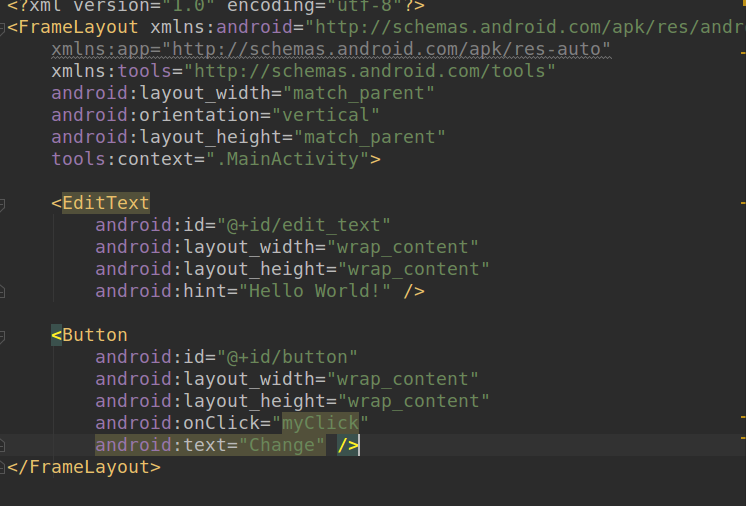

但是可以通过android:layout_gravity 来调整控件的位置。
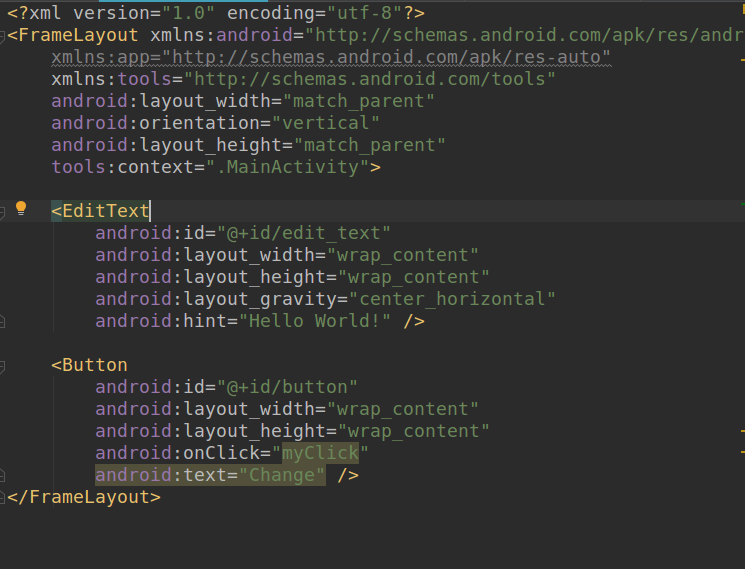
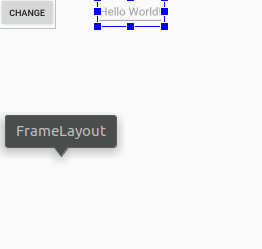
layout_gravity 可以用 | 来叠加参数:
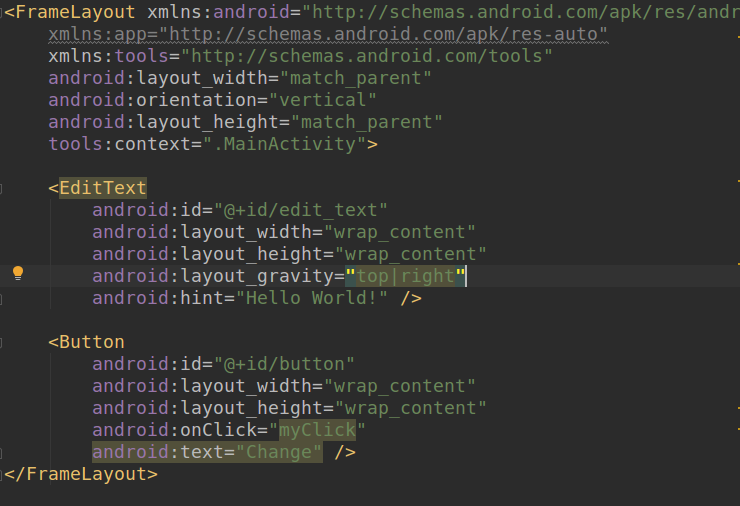
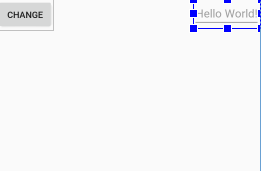
帧布局多用于和Fragment配合使用。
4.百分比布局
因为FrameLayout和RelativeLayout都不支持使用layout_weight的形式来实现比例划分大小,所以android引入了百分比布局—>PercentFrameLayout和PercentRelativeLayout这两个全新的布局。需要引入support库来使用这个布局。
compile 'com.android.support:percent:24.2.1'
使用的时候要注意xml文件上方是否定义了app的命名空间。
xmlns:app="http://schemas.android.com/apk/res-auto"
然后可以使用app:layout_widthPercent=“50%” 和app:layout_heightPercent=“50%” 来实现按照比例划分。
5.布局的复杂用法
1.include布局
可以在另外一个xml文件中使用include语句来复用其他布局文件
<include layout="@layout/xxx"/>
### 2.自定义布局
使用完整的包名路径和类名来引入自定义的布局
<com.android.xxx.xxx.CustomView ... ></com.android.xxx.xxx.CustomView>
6.表格布局TableLayout
7.绝对布局AbsolteLayout
tips:
1.xml文件中的头部,里面有一句
xmlns:android=“http://schemas.android.com/apk/res/android” 是用于定义android的命名空间,之所以能使用android的前缀(比如android:layout_wight=1)就是因为这个道理。